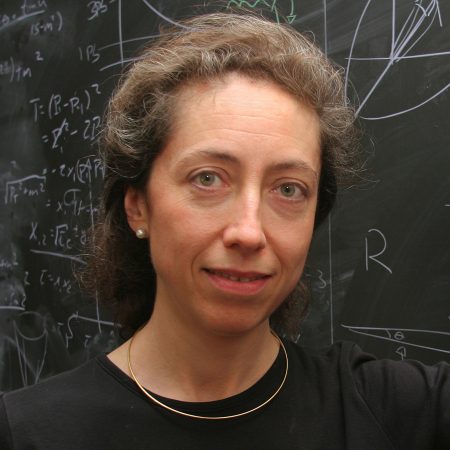
Florida State University Professor Laura Reina has been named Woman Physicist of the Month for February by the American Physical Society’s Committee on the Status of Women in Physics (CSWP).
Reina, who was elected a fellow of the American Physical Society in 2005 and a fellow of the American Association for the Advancement of Science in 2011, conducts research into the phenomenology of elementary particle physics. She is known for her work with the Large Hadron Collider at CERN, the European Organization for Nuclear Research, to assist in the detection of the elusive Higgs boson particle. In July 2012, scientists got their first glimpse of the particle, which helps explain how matter attains its mass.
“It is a great honor for me to be part of the group of women physicists that have been recognized by the American Physical Society through the Woman Physicist of the Month initiative,” Reina said. “I’m very grateful to the colleagues that have taken the initiative and time to nominate me and to support and highlight the image of women physicists. I hope young talented women will read our stories and feel more confident in approaching physics in their studies.”
The CSWP Woman Physicist of the Month award is intended to highlight exceptional female physicists who have positively impacted other individuals’ lives and careers.
“Laura has excelled as a physicist for many years and has received quite a bit of attention for her accomplishments,” said Sam Huckaba, dean of Florida State’s College of Arts and Sciences. “This is a fantastic recognition to add to her portfolio. It shows that she is more than just an outstanding scientist but also a luminary role model for other women working in the field.”
Reina earned a doctorate in high-energy theoretical physics from the International School for Advanced Studies in Trieste, Italy, in 1992. After postdoctoral work at the University of Brussels and at Brookhaven National Laboratory in Upton, N.Y., she joined the University of Wisconsin in Madison as assistant scientist in 1997.
When Reina joined the Department of Physics at Florida State in 1998, she was a recognized expert on b-quark physics and CP (“charge parity”) violation, having written numerous papers on b-quark decays as a graduate student and during her postdoctoral work. At that point, she became excited by the possibility of new results from the Large Hadron Collider (LHC), changed research directions and became a world expert on the phenomenology of the Higgs boson. Knowing that the LHC offered the best chance of detecting the Higgs, she began working closely with the LHC experimenters, doing high precision calculations of the expectations for Higgs searches.
Reina’s research will be particularly important in the next few years, as the Higgs boson’s properties are studied. She specializes in the effects of perturbative QCD (“quantum chromodynamics”) corrections to Higgs phenomenology, and these corrections are vital in determining the interactions and decays of the Higgs. She has developed a number of analytical and numerical algorithms for implementing these corrections, and they have been part of the particle phenomenologist’s toolbox.
“Laura’s work has had an enormous impact matched by few others, and she currently has an extraordinary average of 83 citations per paper,” said Marc Sher, professor of physics at the College of William and Mary. Sher nominated Reina for the distinction of Woman Physicist of the Month.
Reina has helped educate a generation of particle theorists through her well-received Theoretical Advanced Study Institute summer school lectures, which she has given several times during the past decade. She is an excellent teacher, having won teaching awards at Florida State, and is a successful mentor. Her first two doctoral students now have faculty positions at research universities, and most of the others are continuing in the field.
# # #




